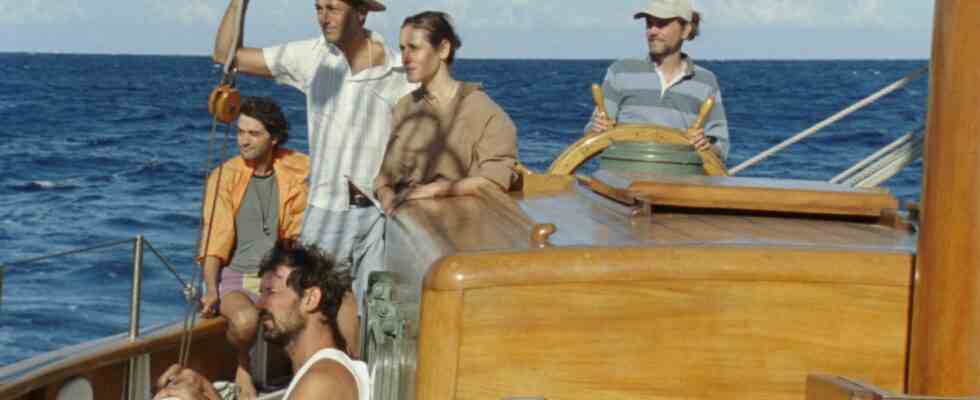At the end, one of the eggs falls to the ground and breaks. Galoup took them out of the fridge, he wanted to make scrambled eggs, started juggling them. You wince at this splash, it brings a moment of irretrievability to this film, to this adventure so completely determined by the sea. Galoup is known from “Beau travail”, the legendary Foreign Legionnaire film by Claire Denis, 1999. He is portrayed by Denis Lavant, who was one of the “Lovers of Pont-Neuf” and played in many of Leos Carax’s films.
A multifaceted adventure film, narrated by a woman, the German film artist Helena Wittmann, with a woman as the heroine. Her name is Ida and she is played by Angeliki Papoulia, who played in three Giorgos Lanthimos films, “Alps”, “Dogtooth” and “The Lobster”. Ida has a sailing ship and a crew of five. “You don’t know much about her,” she says at first. “Such a life means freedom. One is always on the move.”
The rocking on the water of the Mediterranean dictates the movement
The freedom of movement, movement of freedom… Ida has a beautiful nonchalance, permeability, says Helena Wittmann. The boat is initially in a bay off Marseille, it is called “Don de Vent”, gift of the wind. When it starts moving, it goes to Corsica, then on to Algeria, to Sidi bel Abbès, where the French Foreign Legion had its base, its camp, and its own small town for many years.
Ida is fascinated by this myth, as is filmmaker Helena Wittmann, but her journey is not a concentrated, let alone political research trip, just a gentle approximation. The rocking on the water of the Mediterranean dictates the movement, the film’s crew lived together on the boat during the shoot.
The alternation between distance and immersion is at the origin of cinema, between outside and inside, fixed perspective and introspection. “These men seemed to be covering up something, to hide something,” says Helena Wittmann in an interview with Patrick Holzapfel about first encounters with foreign legionnaires. “They were out of my reach. I could only look at them. I tried to make eye contact but they avoided me…Because of that one-sided stare and lack of any interaction, their appearance was reduced to their bodies.”
The song of the legionnaires, which can be heard from the off, has more presence than the bodies, it echoes indifferently, as if from the afterlife, from a past that is barely remembered. “Adieu good old Europe, may the devil take you. Hail, white sun of Algeria… The desert is to us like the sea is to sailors… We need sun and space to give us new splendor… We, the damned of this earth… We never, ever forget a calamity, a disgrace, a woman we loved…”
The men on board are from Portugal, Brazil, Germany, Serbia, Algeria. A real crew, there is no fixed order here, no dominance. They iron, delicately handle valves or dried plants, read letters to themselves and translate them, read from books, “Gourrama”, Friedrich Glauser’s novel about the Foreign Legion, or “The Sailor from Gibraltar” by Marguerite Duras.
You learn a new way of seeing in this cinematic adventure, you just have to dissolve the fixed contours, the certainties and definitions, the boundaries between the animal, vegetative, mineral. A long shot moves slowly through the blue underwater, very gradually the outline of an airplane wreck crystallizes, its surface is encrusted and has its own structure.
Later there are scenes in cyanotype, an old photographic and cinematic process with shades of blue – the film is also an excursion into the early days of cinema. This also includes the story of the formation of corals. There are plants gathered under the water, on which the head of Medusa is to be laid, the stalks of which absorb the blood and harden, and freeze completely.
Human Flowers of Flesh, 2022 – director, script, camera, editor: Helena Wittmann. Composition and sound design: Nika Son. With: Angeliki Papoulia, Vladimir Vulevic, Ferhat Mouhali, Gustavo de Mattos Jahn, Mauro Soares, Steffen Danek, Ingo Martens, Nina Villanova, Denis Lavant. Grand film, 106 minutes. Theatrical release: February 2, 2023.

